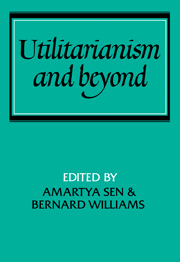Book contents
- Frontmatter
- Contents
- Preface
- Introduction: Utilitarianism and beyond
- 1 Ethical theory and utilitarianism
- 2 Morality and the theory of rational behaviour
- 3 The economic uses of utilitarianism
- 4 Utilitarianism, uncertainty and information
- 5 Contractualism and utilitarianism
- 6 The diversity of goods
- 7 Morality and convention
- 8 Social unity and primary goods
- 9 On some difficulties of the utilitarian economist
- 10 Utilitarianism, information and rights
- 11 Sour grapes – utilitarianism and the genesis of wants
- 12 Liberty and welfare
- 13 Under which descriptions?
- 14 What's the use of going to school?
- Bibliography
10 - Utilitarianism, information and rights
Published online by Cambridge University Press: 30 January 2010
- Frontmatter
- Contents
- Preface
- Introduction: Utilitarianism and beyond
- 1 Ethical theory and utilitarianism
- 2 Morality and the theory of rational behaviour
- 3 The economic uses of utilitarianism
- 4 Utilitarianism, uncertainty and information
- 5 Contractualism and utilitarianism
- 6 The diversity of goods
- 7 Morality and convention
- 8 Social unity and primary goods
- 9 On some difficulties of the utilitarian economist
- 10 Utilitarianism, information and rights
- 11 Sour grapes – utilitarianism and the genesis of wants
- 12 Liberty and welfare
- 13 Under which descriptions?
- 14 What's the use of going to school?
- Bibliography
Summary
Distributive justice and individual rights
‘Social justice,’ writes Hayek, ‘can be given a meaning only in a directed or “command” economy (such as an army) in which individuals are ordered what to do … Indeed … no free action of the individuals could produce results satisfying any principle of distributive justice’ (Hayek 1976, p. 69). Such an unequivocal position is no doubt rare. But the claim that the demands of distributive justice conflict with individual rights – in particular, the right to decision-making – is one that has often been made.
An individual right (such as the right to be treated with the same respect and concern as anyone else) may be defended on the ground that it is an end in itself. Alternatively, it may be defended on the ground that it is instrumental in realising certain desirable ends (e.g. in arguing for the right to private property, because, under certain circumstances, it sustains an efficient allocation of resources). Admittedly, the distinction between these two types of defences is not always sharp. For example, even if a right is regarded as an end, the end may still require justification. Presumably, the justification will be based on the human interests it serves and promotes – for example, by an appeal to the Kantian notion of the autonomy of the individual, or from straightforward utilitarian considerations. In this paper I shall be concerned with economic decentralisation, and, therefore, with the right that individuals may be thought to possess to certain private regions of decision-making – an aspect of ‘protected spheres’, as Professor Hayek would call them.
- Type
- Chapter
- Information
- Utilitarianism and Beyond , pp. 199 - 218Publisher: Cambridge University PressPrint publication year: 1982
- 5
- Cited by



